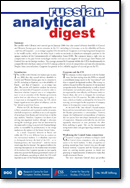Business and State in Komi: Managing Common and Confl icting Interests

Author(s): Yury Shabaev
Editor(s): Matthias Neumann, Robert Orttung, Jeronim Perovic, Heiko Pleines, Hans-Henning Schröder
Series: Russian Analytical Digest (RAD)
Issue: 8
Pages: 12-14
Publisher(s): Center for Security Studies (CSS), ETH Zurich; Research Centre for East European Studies, University of Bremen
Publication Year: 2006
